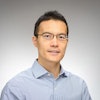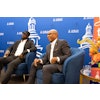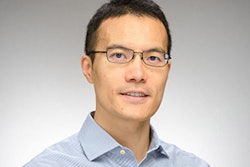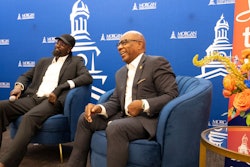The Sage In his own Words
Dr. John Hope Franklin is without question a giant among historians. His outstanding record of research and scholarship has won the admiration of U.S. presidents, fellow educators and scholars from around the globe. This gentleman/scholar is still turning out award-winning books even as an octogenarian. BI Senior Writer Joan Morgan spoke with him at Duke University recently about the new center, the influence of his parents and the writing of his upcoming autobiography.
Morgan: When did you find out about plans to build a center at Duke University in your honor and what was your reaction?
Franklin: Various people had told me about it. Then the president (Dr. Nan Keohane) sent for me and said, “I know you know what I want to tell you about because it’s in the streets.” And she wanted to know if I would grant permission for my name to be used in the center. I told her I was deeply moved, honored and pleased. This project is so exciting. As you know, they are seeking to carry on and replicate the things I’ve been interested in all my life — the various facets of international education, interdisciplinary education and of course, ethnic and race problems.
Morgan: I think more people may be familiar with your writings on ethnic and race problems than on those writings and works in interdisciplinary and international studies. Can you tell us more about the work you’ve done in those areas?
Franklin: I have tried, even as I worked in history of the South and African American history, to cut across disciplines. I think the story, and the problems are not confined to any one area. The economic problems, political problems, social problems and religious problems, almost any aspect of the area you want to focus on is in turn a part of the intellectual problems pursued. So that it was very important to me to make certain that my approach to any problem is a broad approach and encompasses many facets of the problem. You can’t just focus on, say, the politics of race for you have at the same time the economics of race and they impinge on each other. Indeed they tend to affect each other. That is why you have to study them and get some understanding of the way in which the problem flows, which direction it’s going and whether it’s being ameliorated or solved, or regressed. It’s important to see these things.
I began to travel abroad almost 50 years ago. I first went to the Center of American Studies at Salzburg, Austria, right after the war [World War II]. I ran into Europeans of all complexions and kinds. There were even Germans there, despite the fact that they had been so recently in the “dog house” as it were. There were Yugoslavs, French, English, Scotch and Scandinavians and I saw that the problems they confronted were problems which had something in common with the problems which we confront in this country. I remember the first time I was in England. I saw the race problem rearing its head. And I went back many times after that in the 50s and 60s and it was still with them and they were curious about ours.
When I went to Africa, I saw the heavy hand of colonialism and imperialism and it was reminiscent of what we have in this country. I went to Australia and there I saw an entirely different situation. People were talking about the White Australian policy and of course, I thought of the Black/White paradigm. But what they really meant was the White Australian policy as it applied to Asians — the Japanese, Chinese and people of the islands.
Morgan: You’ve spoken before about the influence of your father on your life. Tell me about that.















